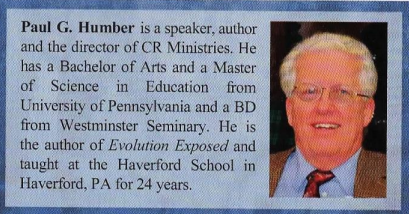Many followers of Christ are aware of Old Testament passages that predict His suffering, but not so many are aware of passages that predict His resurrection. It is the purpose here to share 17 passages from the Old Testament that point to the resurrection of the Messiah. Following His resurrection, the Lord Jesus said '"that all things which are written about Me in the Law of Moses and the Prophets and the Psalms must be fulfilled.' Then He opened their minds to understand the Scriptures, and He said to them, 'Thus it is written, that the Christ would suffer and rise again from the dead the third day"' (Lk 24:44b-45). The approach here is to start from Genesis and traverse through the Old Testament sequentially, as arranged in most Bibles.
The first passage for consideration is Genesis 22:5, "He said to his servants, 'Stay here with the donkey while I and the boy go over there. We will worship and then we will come back to you.'" Abraham knew that his assignment was to slay Isaac, his son; nevertheless, he had faith that they both ("we" ) would return. Since Isaac is a type of the greatest "son of Abraham" (Mt 1:1), the Messiah, this is a foreshadowing of Christ 's eventual resurrection. As it turned out, God did not need to raise Isaac from the dead, but God did raise His own Son, Jesus, from the dead. There is also a subtle picture here of Abraham's heart of faith in a future resurrection, and this may have been part of what Jesus had in mind when He said, "Abraham rejoiced at the thought of seeing My day; he saw it and was glad" (Jn 8:56).
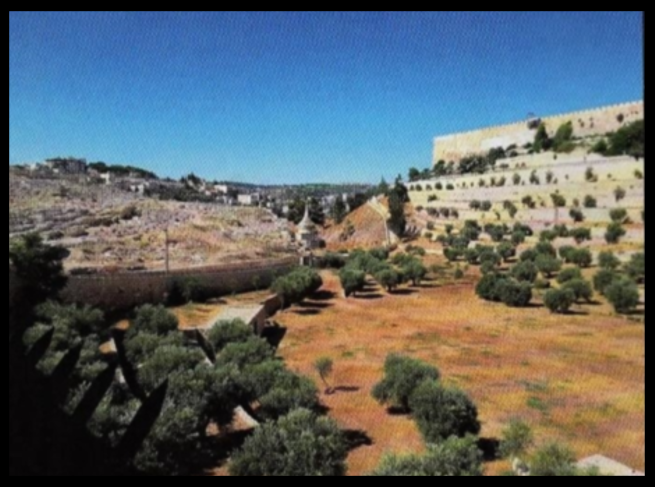
The second passage1 is from Leviticus 23:9-11:
And the LORD spoke to Moses, saying, "Speak to the people of lsrael and say to them, When you come into the land that I give you and reap its harvest, you shall bring the sheaf of the firstfruits of your harvest to the priest, and he shall wave the sheaf before the LORD, so that you may be accepted. On the day after the Sabbath the priest shall wave it."
The phrase, "On the day after the Sabbath," is interesting. The day after the Sabbath is Sunday, the day many believe the Lord came alive after His death, many centuries after Leviticus was written. The Apostle Paul even described Christ's resurrection in terms of "the firstfruits" (1 Cor 15:20), a phrase also mentioned here in this Old Testament passage. Could waving the firstfruits on Sunday have prophetic significance in terms of Christ's resurrection on the day after the Sabbath? This may be a subtle hint; although there are many other passages to follow that are far more explicit.
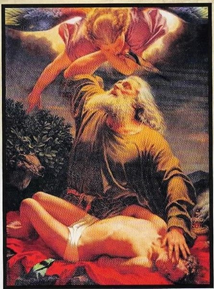 Abraham Sacrificing Isaac by Gerhardt Wilhelm von Reutern, 1849. Oil on canvas. Photo Credit: Wikimedia Commons
Abraham Sacrificing Isaac by Gerhardt Wilhelm von Reutern, 1849. Oil on canvas. Photo Credit: Wikimedia Commons
A third passage is from Job 19:23-27:
Oh that my words were written! Oh that they were inscribed in a book! Oh that with an iron pen and lead they were engraved in the rock forever! For I know that my Redeemer lives, and at the last he will stand upon the earth. And after my skin has been thus destroyed, yet in my flesh I shall see God, whom l shall see for myself, and my eyes shall behold, and not another. My heart faints within me!
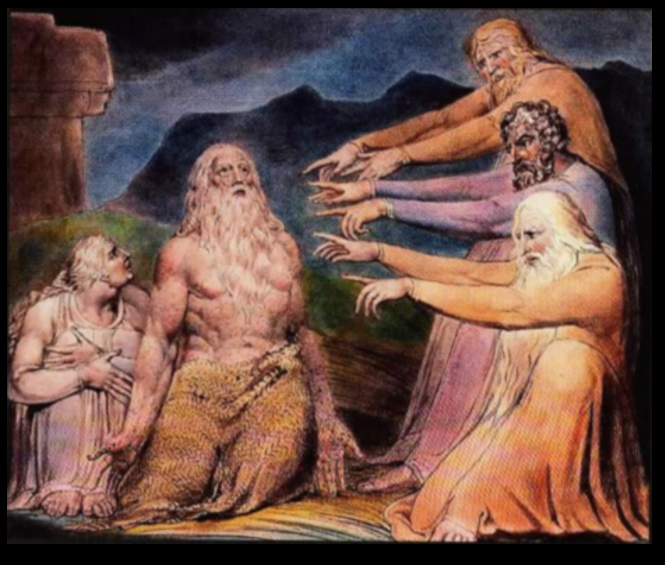
What a magnificent picture of Christ's faith in His Father to raise Him from the dead! Yes, Job was showing his faith too, but His words transcend Job's particulars. Christ's "Redeemer," the One who by the Spirit would raise His Son from the tomb, was none other than God the Father. Jesus knew that after the cross and the tomb, in His "flesh" He would "see God." Nevertheless, He needed to go to the cross. Were Job's words here on Christ's lips when He prayed in the Garden to His Father with bloody sweat, "My heart faints within me"? Was this one of the passages Jesus used to explain to His disciples on the Emmaus Road the necessity both of His suffering and resurrection?
The fourth passage is Psalm 6:4-5, 10:
Turn, O LORD, deliver My life; save Me for the sake of Your steadfast love. For in death there is no remembrance of You; in Sheol who will give You praise? All My enemies shall be ashamed and greatly troubled; they shall turn back and be put to shame in a moment.
Is this another passage the Lord might have referred to when He said to the Emmaus disciples, '"Was it not necessary that the Christ should suffer these things and enter into his glory?' And beginning with Moses and all the Prophets, he interpreted to them in all the Scriptures the things concerning himself" (Lk 24:26-27)? He spoke of suffering and also of glory. Was the psalmist asking for deliverance from death? Some of the enemies of Christ were indeed "greatly troubled" by His resurrection which occurred "in a moment"—at the crack of dawn.
The fifth passage is Psalm 9:13, "Be gracious to Me, O LORD! See My affliction from those who hate Me, O You who lift Me up from the gates of death..." The Father did indeed see Christ's "affliction from those who" hated Him and lifted Him "up from the gates of death." David's experience was but a foreshadowing of Messiah's experience on the cross and Resurrection Sunday.
The sixth passage is Psalm 12:5, "Because the poor are plundered, because the needy groan, I will now arise," says the LORD; " I will place Him in the safety for which He longs." Exactly how did the LORD "arise"?
And He arose and left the synagogue and entered Simon's house. Now Simon's mother-in-law was ill with a high fever, and they appealed to Him on her behalf. And He stood over her and rebuked the fever, and it left her, and immediately she rose and began to serve them. Now when the sun was setting, all those who had any who were sick with various diseases brought them to Him, and He laid His hands on every one of them and healed them" (Lk 4:38-39).
Jesus also ascended the cross for the groaning "needy" and arose from the tomb on Resurrection Sunday to place believers in "safety."
The seventh passage is Psalm 16:8-11:
I have set the LORD always before Me. Because He is at My right hand, I will not be shaken. Therefore My heart is glad and My tongue rejoices; My body also will rest secure, because You will not abandon Me to the grave, nor will You let your Holy One see decay. You have made known to Me the path of life; You will fill Me with joy in Your presence, with eternal pleasures at Your right hand.
This is about Messiah Jesus! Listen to the Apostle Peter speak about this Psalm:
Men of Israel, listen to this: Jesus of Nazareth was a man accredited by God to you by miracles, wonders and signs, which God did among you through Him, as you yourselves know. This man was handed over to you by God's set purpose and foreknowledge; and you, with the help of wicked men, put Him to death by nailing Him to the cross. But God raised Him from the dead, freeing Hirn from the agony or death, because it was impossible for death to keep its hold on Him. David said about Him: "I saw the Lord always before Me. Because He is at My right hand, I will not be shaken. Therefore My heart is glad and My tongue rejoices; My body also will live in hope, because You will not abandon Me to the grave, nor will You let Your Holy One see decay. You have made known to Me the paths or life; You will fill Me with joy in your presence" (Acts 2:22-28).
Peter continued:
Brothers, I can tell you confidently that the patriarch David died and was buried, and his tomb is here to this day. But he was a prophet and knew that God had promised him on oath that He would place one or his descendants on his throne. Seeing what was ahead, He spoke of the resurrection of the Christ, that He was not abandoned to the grave, nor did His body see decay. God has raised this Jesus to life, and we are all witnesses of the fact. Exalted to the right hand of God, He has received from the Father the promised Holy Spirit and has poured out what you now see and hear (Acts 2:29-33).
The Apostle Paul agreed with Peter:
Brothers, children of Abraham, and you God-fearing Gentiles, it is to us that this message of salvation has been sent. The people of Jerusalem and their rulers did not recognize Jesus, yet in condemning Him they fulfilled the words of the prophets that are read every Sabbath.Though they found no proper ground for a death sentence, they asked Pilate to have Him executed. When they had carried out all that was written about Him, they took Him down from the tree and laid Him in a tomb. But God raised Him from the dead, and for many days He was seen by those who had traveled with Him from Galilee to Jerusalem. They are now His witnesses to our people. We tell you the good news: What God promised our fathers He has fulfilled for us, their children, by raising up Jesus. As it is written in the second Psalm: " You are my Son; today l have become your Father" (Ps 2:7). The fact that God raised Him from the dead, never to decay, is stated in these words: "I will give You the holy and sure blessings promised to David" (ls 55:3). So it is stated elsewhere: "You will not let Your Holy One see decay" (Ps 16:10). For when David had served God's purpose in his own generation, he fell asleep; he was buried with his fathers and his body decayed. But the One whom God raised from the dead did not see decay. Therefore, my brothers, I want you to know that through Jesus the forgiveness of sins is proclaimed to you. Through Him everyone who believes is justified from everything you could not be justified from by the law of Moses (Acts 13:26-39).

The eighth passage is from Psalm 30:1-5:
I will extol You, O Lord, for You have lifted Me up, and have not let My enemies rejoice over Me. O Lord my God, I cried to You for help, and You healed me. O Lord, You have brought up My soul from Sheol; You have kept Me alive, that I would not go down to the pit. Sing praise to the Lord, you His godly ones, and give thanks to His holy name. For His anger is but for a moment, His favor is for a lifetime; weeping may last for the night, but a shout of joy comes in the morning.
This psalm is prophetic of the Messiah. David was indeed lifted up—but not like his greatest son. The Lord Jesus did indeed cry to His Father "for help, and You healed Me. O Lord, You have brought up My soul from Sheol; You have kept Me alive, that I would not go down to the pit." Jesus' bones did not decay in the tomb. His Father's "anger" was "but for a moment," but "His favor is for a lifetime." Weeping did "last for the night, but a shout of joy" came "in the morning" when His followers saw Him alive from death.
The ninth passage is Psalm 40:1-3:
I waited patiently for the LORD; He inclined to Me and heard My cry. He drew Me up from the pit of destruction, out of the miry bog, and set My feet upon a rock, making My steps secure. He put a new song in My mouth, a song of praise to our God. Many will see and fear, and put their trust in the LORD.
This is an utterly magnificent prophecy of Jesus' resurrection. Jesus did indeed wait "patiently for the LORD," his Father. The Father did indeed hear Christ's "cry" from the Garden of Gethsemane and the cross and "drew (Him) up from the pit of destruction, out of the miry bog, and set (His) feet upon a rock, making (His) steps secure." The Father also "put a new song in" the Messiah's mouth, "a song of praise to our God." God the Son had never before experienced death and triumphing over it! Indeed, many have seen it and have "put their trust in the LORD"!
The tenth passage is Psalm 41:11-12, "By this I know that You delight in Me: My enemy will not shout in triumph over Me. But You have upheld Me because of My integrity, and set Me in Your presence lastingly." David could not really speak of his own "integrity," for David was a sinner and knew it. Regarding the Messiah, however, Christ had "integrity," and His enemy could not "shout in triumph over" Him. How could any enemy of Christ shout in triumph over His resurrection?
The eleventh passage is Psalm 49:15, "But God will ransom My soul from the power of Sheol, for He will receive Me. Selah." If Selah means "Pause and reflect on that," let us obey. First, who is referenced by "My" and "Me"? The "Sons of Korab"? No, this is another magnificent promise of resurrection for Messiah Jesus. Jesus knew His Father would raise Him from "Sheol" because the Scriptures said so.
The twelfth passage is Psalm 56:13, "For You have delivered My soul from death, yes, My feet from falling, that I may walk before God in the light of life." I believe David's soul was delivered "from death" by virtue of Christ's atonement on the cross a thousand years later, but I also believe the fuller meaning of this is the foreshadowing of the Messiah's deliverance from the clutches of death—yet another foreshadowing promise of Christ's resurrection.
The thirteenth passage is Isaiah 53:10, "Yet it was the will of the LORD to crush Him; He has put Him to grief; when His soul makes an offering for guilt, He shall see His offspring; He shall prolong His days; the will of the LORD shall prosper in His hand." Here we see a life beyond death. Though this Messiah would die (verse 9), we see that "He shall see His offspring." How can a dead man see offspring unless He is brought back to life? Yes, Jesus did see the one thief repent and place trust in Him, but that was just moments before both died. The prophecy says that the Father would "prolong His days" not just minutes. Of course, the Lord Jesus also promised everlasting life to all those who experience His resurrection.
The fourteenth passage is Isaiah 53:11, "Out of the anguish of His soul He shall see and be satisfied; by His knowledge shall the Righteous One, My Servant, make many to be accounted righteous, and He shall bear their iniquities." This is another extremely precious verse. First, the resurrection idea we saw in the previous verse continues, "Out of the anguish of His soul He shall see and be satisfied." How can a dead man "see" unless He is made alive again? Second, notice that the Messiah is called the "Righteous One." He, in fact, is the only "Righteous One" in all history—from Adam and Eve to you and me. But notice finally, His righteousness is imputed to "many." Sins of sinners were imputed to the Messiah. In a magnificent reversal, His righteousness is imputed to those who trust in Him.
The fifteenth passage is Jeremiah 15:21, "I will deliver You out of the hand of the wicked, and redeem You from the grasp of the ruthless." God's promise here to Jeremiah foreshadows His promise to His Son, the Messiah. Jesus would indeed be delivered "out of the hand of the wicked." This happened especially on Resurrection (Sunday) Morning.
The sixteenth passage is Hosea 6:1-2, "Come, let us return to the LORD; for He has torn us, that He may heal us; He has struck us down, and He will bind us up. After two days He will revive us; on the third day He will raise us up, that we may live before Him." The Apostle Paul wrote that believers in Jesus are buried into His death and can walk in newness of life because Jesus was raised from the dead. "We were buried therefore with him by baptism into death, in order that, just as Christ was raised from the dead by the glory of the Father, we too might walk in newness of life" (Rom 6:4). Albert Barnes wrote, "After two days will He revive us (or quicken us, give us life), in the third day He will raise us up—The Resurrection of Christ, and our resurrection in Him and in His Resurrection, could not be more plainly foretold."2 That last part may be an overstatement; nevertheless, Barnes does have a point. Also, Matthew Henry, note, "But this seems to have a further reference to the resurrection of Jesus Christ."3
The seventeenth and final passage we examine is Jonah 2:10, "And the LORD spoke to the fish, and it vomited Jonah out upon the dry land." Messiah Jesus knew that He would overcome death (cf. Lk 18:31-33; 24:45-47), and Jonah served as a foreshadowing. He said:
An evil and adulterous generation seeks after a sign; and there shall no sign be given to it, but the sign of the prophet Jonah: for as Jonah was three days and three nights in the whale's belly; so shall the Son of Man be three days and three nights in the heart of the earth (Mt 12:39,40).
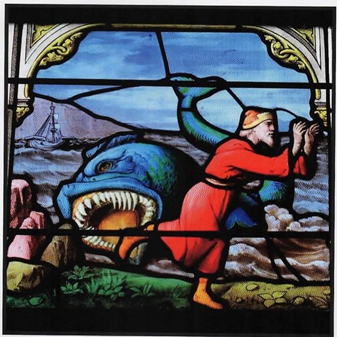 Jesus' sign to the Pharisees in Matthew 12:39,40 was the sign of the prophet Jonah, who was "three days and three nights in the belly of the great fish" (ESV). Stained glass in Eglise Saint-Aignan de Chartres in Chartres, Darstellung. Photo Credit: Wikimedia Commons
Jesus' sign to the Pharisees in Matthew 12:39,40 was the sign of the prophet Jonah, who was "three days and three nights in the belly of the great fish" (ESV). Stained glass in Eglise Saint-Aignan de Chartres in Chartres, Darstellung. Photo Credit: Wikimedia Commons
Jonah was vomited out upon the dry land, and Jesus came forth from the mouth of a tomb. Scoffers deny the reality of Jonah's remarkable deliverance and Jesus' triumphant resurrection. At the same time, they affirm that all the complexity of life and the order of the universe came into being without governance or design—from nothing. Jonah, as a type of the greatest prophet, was sent on a vital mission. So was the Lord Jesus (cf. Jn 3:16). Each preached repentance, and each prayed in distress (Jon 2, Mk 14:32 -39). Jonah was displeased with God's compassion toward his enemies. The Lord Jesus, however, became the embodiment of God's compassion toward sinners. The lesser prophet was concerned for a mere, physical vine (Jon 4:8,9), but the Lord of glory was concerned for people who could not "discern between their right hand and their left hand" (Jon 4:11). His aim was and is to engraft people into the true vine, Himself (Jn 15:1). Great was, and is, His love for people! Nineveh repented at the preaching of the lesser prophet, and Jonah had no rest until he rested in the Lord's will. The Lord Jesus, however, calls to sinners, "Come unto me, all ye that labor and are heavy laden, and I will give you rest" (Mt 11:28).
Endnotes for this article can be found at www.BibleArchaeology.org
Type "Endnotes" in the search box; next, click the "Bible and Spade Bibliographies and Endnotes" link; then page down to the article.
Read more GENERAL APOLOGETICS articles here: https://biblearchaeology.org/research/topics/general-apologetics







